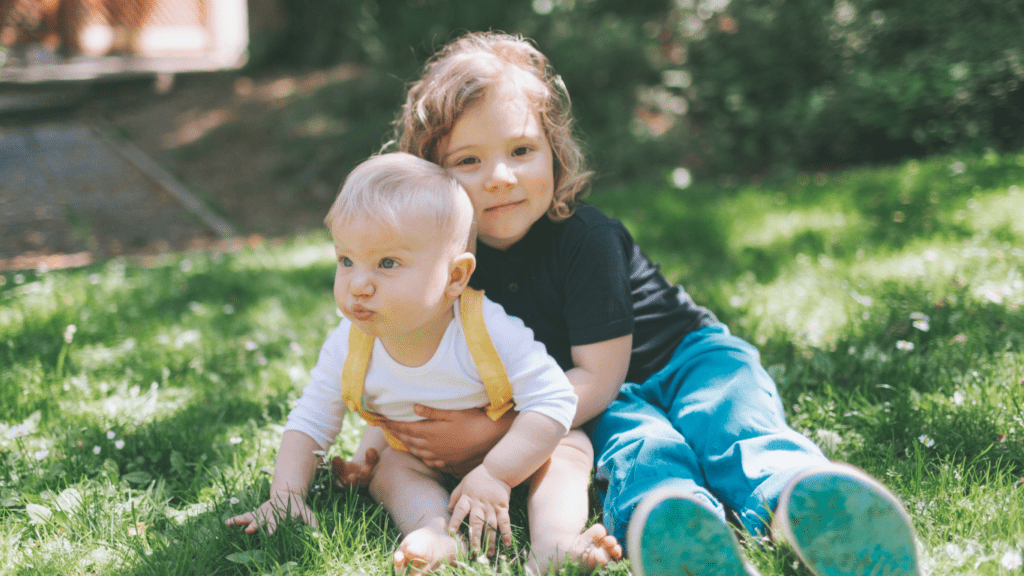Growing up with siblings can be a unique and rewarding experience. As a parent, fostering healthy relationships between your children is crucial for their emotional development and overall well-being.
In this article, I’ll share valuable insights and practical tips on how to nurture strong bonds and minimize conflicts among siblings. From setting clear communication channels to encouraging teamwork and empathy, there are various strategies you can implement to promote a positive sibling dynamic.
By creating a supportive environment where mutual respect and understanding are prioritized, you can help your children build lasting connections that will benefit them throughout their lives. Join me as we explore the importance of sibling relationships and discover effective ways to cultivate harmony and camaraderie among your children.
Whether you’re navigating sibling rivalry or simply aiming to strengthen the bond between your kids, this article will provide you with the tools you need to promote a healthy and loving sibling relationship.
Understanding Sibling Dynamics
Sibling dynamics are complex and can significantly impact family relationships. As a parent myself, I’ve learned that understanding these dynamics is crucial to fostering healthy interactions among siblings.
By recognizing the unique dynamics at play, I can better support my children in building strong and positive relationships with each other. One key aspect of sibling dynamics is birth order. Birth order can influence personality traits, behaviors, and roles within the family.
For instance, the eldest child may take on a leadership role, while the youngest may be more carefree. Being aware of these tendencies helps me tailor my parenting approach to meet each child’s individual needs and promote harmony among siblings.
Moreover, sibling rivalry is a common issue that many parents face. Siblings may compete for attention, resources, or parental approval, which can lead to conflicts.
By acknowledging and addressing these feelings of rivalry, I can help my children learn to resolve disputes peacefully and understand that differences are natural. Another important aspect of sibling dynamics is communication.
Open and honest communication is essential for fostering healthy relationships among siblings. Encouraging my children to express their thoughts and feelings, listening actively, and teaching them conflict resolution skills are vital strategies in promoting positive interactions and minimizing misunderstandings.
Overall, understanding sibling dynamics allows me to create a supportive environment where my children can learn to cooperate, empathize, and build lasting bonds with one another. By being mindful of these dynamics and implementing effective communication and conflict resolution strategies, I can nurture strong sibling relationships based on mutual respect and love.
Benefits of Healthy Sibling Relationships
Fostering healthy sibling relationships offers numerous advantages for children’s development and overall family dynamics. Here are some key benefits of promoting positive interactions among siblings:
- Improved Emotional Support: Encouraging a strong bond between siblings creates a built-in support system for children. They can rely on each other for emotional support, comfort, and companionship, fostering a sense of security and belonging within the family.
- Enhanced Social Skills: Interacting with siblings helps children develop essential social skills such as communication, problem-solving, and cooperation. Through play and daily interactions, they learn how to navigate relationships, resolve conflicts, and work as a team.
- Boosted Self-Esteem: Positive relationships with siblings contribute to children’s self-esteem and confidence. Siblings can provide validation, encouragement, and constructive feedback, helping each other build a positive self-image and belief in their abilities.
- Increased Empathy and Understanding: Growing up with siblings allows children to practice empathy, understanding, and perspective-taking. They learn to consider others’ feelings, share, and compromise, promoting empathy and compassion towards their siblings and others.
- Lifelong Support System: Strong sibling relationships often endure into adulthood, creating a long-term support network. Siblings can offer emotional support, advice, and companionship throughout various life stages, enhancing overall well-being and resilience.
- Shared Memories and Identity: Siblings share unique memories, experiences, and traditions that contribute to a shared family identity. These shared bonds create a sense of belonging and connection, fostering a rich family history and strengthening the family unit.
- Better Conflict Resolution Skills: Negotiating conflicts with siblings teaches children valuable conflict resolution skills. They learn how to express their emotions effectively, listen to others’ perspectives, and find mutually satisfactory solutions, preparing them for handling disagreements in various relationships.
- Emotional Regulation and Coping Strategies: Sibling relationships provide opportunities for children to practice emotional regulation and coping strategies. They learn to manage their emotions, deal with disappointment, and find constructive ways to address challenges, promoting resilience and emotional well-being.
Promoting healthy sibling relationships is key to fostering a supportive and nurturing family environment that nurtures children’s emotional development, social skills, and overall well-being.
Healthy Strategies for Fostering Positive Bonds
When it comes to fostering positive sibling relationships, as a parent, I’ve found that certain strategies can make a significant difference in promoting harmony and understanding among children. Here are some key tips to encourage strong bonds among siblings:
Encouraging Open Communication
I find that fostering open communication is crucial in nurturing healthy relationships among siblings. By creating a supportive environment where children feel comfortable expressing their thoughts and feelings, parents can help prevent misunderstandings and conflicts.
It’s essential to actively listen to each child, acknowledge their perspectives, and promote empathy towards one another.
Teaching Conflict Resolution Skills
In my experience, teaching children effective conflict resolution skills is paramount for fostering positive sibling relationships. By providing guidance on how to negotiate disagreements peacefully and find mutually beneficial solutions, parents can empower their children to manage conflicts constructively.
Encouraging siblings to communicate calmly, actively listen to each other, and work towards compromises can help build strong bonds based on respect and understanding.
Nurturing Individuality and Sibling Bond
In fostering healthy sibling relationships, it’s crucial to recognize and celebrate the individuality of each child. Encouraging uniqueness while fostering a strong bond between siblings can lead to a harmonious dynamic within the family.
Here are some strategies to promote both individuality and a strong sibling bond:
- Recognize and Celebrate Differences: Acknowledge and celebrate each child’s unique strengths, interests, and personality traits. Encourage siblings to appreciate and respect each other’s differences, fostering a sense of acceptance and understanding.
- Foster Shared Experiences: Create opportunities for siblings to engage in activities they both enjoy. Encourage shared experiences such as family outings, game nights, or collaborating on projects to strengthen their bond.
- Support Personal Space and Boundaries: Respect each child’s need for personal space and boundaries. Help siblings establish boundaries and communicate their preferences to promote respect and understanding.
- Promote Sibling Collaboration: Encourage teamwork and collaboration on tasks or projects. Support siblings in working together to achieve common goals, fostering a sense of unity and cooperation.
By nurturing individuality while fostering a strong sibling bond, parents can cultivate a supportive and respectful environment where children can develop healthy relationships that last a lifetime.
The Role of Parents in Sibling Relationships
In fostering healthy sibling relationships, the role of parents is crucial. I believe that parents serve as the primary influencers in shaping the dynamics among their children.
It’s my belief that by providing guidance, setting a positive example, and creating a supportive environment, parents can nurture strong bonds and foster empathy and understanding between siblings. I emphasize the importance of promoting open communication within the family.
I believe that encouraging children to express their thoughts and feelings openly creates a space for honest dialogues, resolving conflicts, and strengthening relationships. By actively listening to each child and addressing their concerns with sensitivity, parents can guide siblings in navigating disagreements constructively.
Furthermore, I suggest that parents recognize and celebrate the individuality of each child. I believe that acknowledging and appreciating each child’s unique strengths, interests, and characteristics can cultivate acceptance and respect among siblings.
By creating a supportive atmosphere that values diversity and celebrates differences, parents can foster a sense of inclusivity and understanding within the family unit. In addition, I recommend that parents create opportunities for shared experiences among siblings.
I believe that engaging in activities together, such as family outings, game nights, or collaborative projects, can forge bonds and create lasting memories. These shared moments not only promote cooperation and teamwork but also help siblings develop a sense of unity and belonging within the family.
Overall, I advocate for parents to play an active role in promoting positive sibling relationships by fostering open communication, celebrating individuality, and creating shared experiences. By investing time and effort into cultivating harmonious dynamics among their children, parents can contribute to the development of strong, supportive relationships that last a lifetime.



 Deborah Sextoneer brought her passion for community building and user engagement to Dazzling Holly Moms, playing a vital part in the platform's development. With her keen understanding of the challenges mothers face, Deborah ensured that the content resonates with moms and addresses their diverse needs. Her efforts in creating interactive features and fostering a supportive community have made Dazzling Holly Moms a go-to platform for mothers looking for practical advice and a sense of belonging. Deborah’s contributions have been essential to the project's ongoing success.
Deborah Sextoneer brought her passion for community building and user engagement to Dazzling Holly Moms, playing a vital part in the platform's development. With her keen understanding of the challenges mothers face, Deborah ensured that the content resonates with moms and addresses their diverse needs. Her efforts in creating interactive features and fostering a supportive community have made Dazzling Holly Moms a go-to platform for mothers looking for practical advice and a sense of belonging. Deborah’s contributions have been essential to the project's ongoing success.